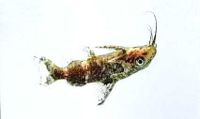Upside-Down Catfish (Synodontis nigriventris)
From The Aquarium Wiki
Upside-Down Catfish
Synodontis nigriventris
114 Litres (30 US G.)
7.6-10.2cm (3-4 ")
Freshwater
6.0 - 7.5
22 -28 °C (71.6-82.4°F)
8-18 °d
1:2 M:F
5-8 years
Family
Mochokidae
Contents
Additional names
- Upside Down Catfish, Blotched Upsidedown Catfish
Additional scientific names
- Synodontis nigroventris
Sexing[edit]
- The female is larger than the male and will also appear more plump.
Tank compatibility[edit]
- A relatively peaceful catfish, keep with other similar sized community fish. It prefers to be in numbers of it's own kind; in the wild, it travels in schools of several thousand. If there are only 2 kept in an aquarium, one may begin to dominate the other.
Diet[edit]
- Omnivore. Readily accepts flakes, but will appreciate frozen foods such as bloodworm and brine shrimp.
Feeding regime[edit]
- May be fed up to three times daily. This may be the only time the fish will turn "right side up" as it scours the substrate for food.
Environment specifics[edit]
- Needs to have a have a place where it can hide, as well as rest up against something, upside down. Bogwood and rocks with a large hollow are ideal for this purpose. Dense vegetation provides a good cover too.
Behaviour[edit]
- It is very common for these fish to remain upside down, as stated above, may only turn right side up for feeding. The upside-down habit develops and becomes more common as the fish matures.
Identification[edit]
- Will mostly be found upside-down in the tank, has several barbels and a high back. Colouration varies and pales as the fish ages, but it is generally a dark grey with is blotched in various shades of grey and pale cream, occasionally appearing as vertical uneven bands on the flanks. Can be mistaken with Synodontis contractus, but the S.contractus has a larger head and eyes.
Pictures[edit]
External links[edit]
- Fishbase (Mirrors:
 )
)

